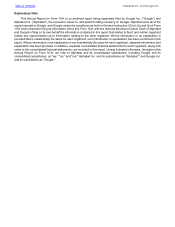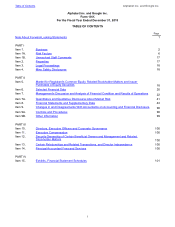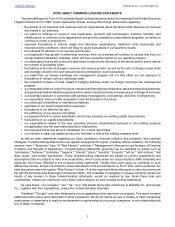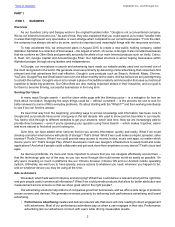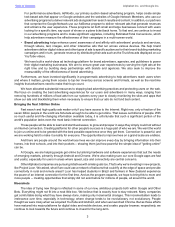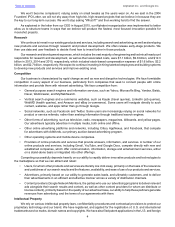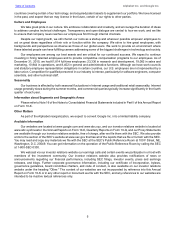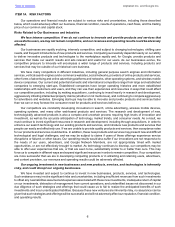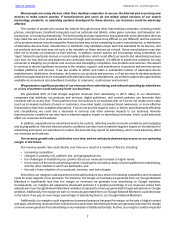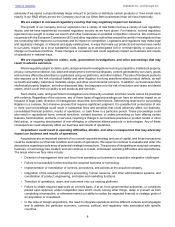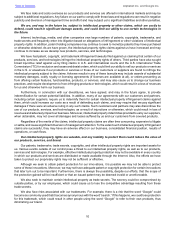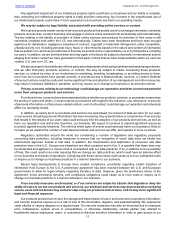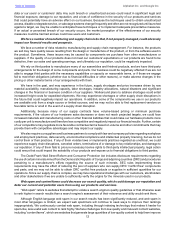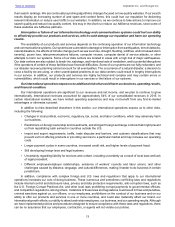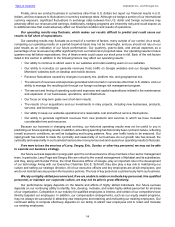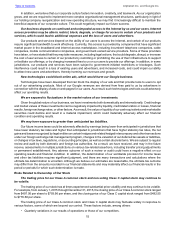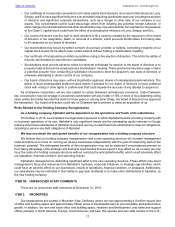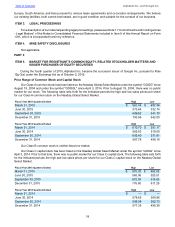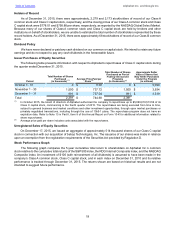Google 2015 Annual Report Download - page 13
Download and view the complete annual report
Please find page 13 of the 2015 Google annual report below. You can navigate through the pages in the report by either clicking on the pages listed below, or by using the keyword search tool below to find specific information within the annual report.
Table of Contents Alphabet Inc. and Google Inc.
9
• Cultural challenges associated with integrating employees from the acquired company into our organization,
and retention of employees from the businesses we acquire.
• Liability for activities of the acquired company before the acquisition, including patent and trademark
infringement claims, privacy issues, violations of laws, commercial disputes, tax liabilities, and other known
and unknown liabilities.
• Litigation or other claims in connection with the acquired company, including claims from terminated employees,
customers, former stockholders, or other third parties.
Our failure to address these risks or other problems encountered in connection with our past or future acquisitions
and investments could cause us to fail to realize the anticipated benefits of such acquisitions or investments, incur
unanticipated liabilities, and harm our business generally.
Our acquisitions could also result in dilutive issuances of our equity securities, the incurrence of debt, contingent
liabilities, or amortization expenses, or impairment of goodwill and/or purchased long-lived assets, and restructuring
charges, any of which could harm our financial condition or results. Also, the anticipated benefits or value of our
acquisitions or investments may not materialize.
Our business depends on a strong brand, and failing to maintain and enhance our brand would hurt our
ability to expand our base of users, advertisers, Google Network Members, and other partners.
Our strong Google brand has significantly contributed to the success of our business. Maintaining and enhancing
the brands of both Google and Other Bets increases our ability to enter new categories and launch new and innovative
products that better serve the needs of our users. Our brands may be negatively impacted by a number of factors,
including, among others, reputational issues and product/technical performance failures. Further, if we fail to maintain
and enhance equity in the Google brand, our business, operating results, and financial condition may be materially
and adversely affected. Maintaining and enhancing our brand will depend largely on our ability to remain a technology
leader and continue to provide high-quality, innovative products and services that are truly useful and play a meaningful
role in people’s everyday lives.
A variety of new and existing laws could subject us to claims or otherwise harm our business.
We are subject to numerous U.S. and foreign laws and regulations covering a wide variety of subject matters.
New laws and regulations (or new interpretations of existing laws and regulations) may also impact our business. For
example, current and new patent laws such as U.S. patent laws and European patent laws may affect the ability of
companies, including us, to protect their innovations and defend against claims of patent infringement. The costs of
compliance with these laws and regulations are high and are likely to increase in the future.
Claims have been, or may be, threatened and filed against us under both U.S. and foreign laws for defamation,
invasion of privacy and other tort claims, unlawful activity, patent, copyright and trademark infringement, product liability,
or other theories based on the nature and content of the materials searched and the ads posted by our users, our
products and services, or content generated by our users. Furthermore, many of these laws do not contemplate or
address the unique issues raised by a number of our new businesses, products, services and technologies. In addition,
the applicability and scope of these laws, as interpreted by the courts, remain uncertain. For example, the laws relating
to the liability of providers of online services are currently unsettled both within the U.S. and abroad.
In addition, other laws that could subject us to claims or otherwise harm our business include, among others:
• The Digital Millennium Copyright Act, which has provisions that limit in the U.S., but do not necessarily eliminate,
our liability for caching or hosting, or for listing or linking to, third-party websites that include materials that
infringe copyrights or other rights, so long as we comply with the statutory requirements of this act. Any future
legislation impacting these safe harbors may adversely impact us.
• Court decisions such as the ‘right to be forgotten’ ruling issued by the European court, which allows individuals
to demand that Google remove search results about them in certain instances, may limit the content we can
show to our users.
• Various U.S. and international laws that restrict the distribution of materials considered harmful to children and
impose additional restrictions on the ability of online services to collect information from minors.
• Data protection laws passed by many states that require notification to users when there is a security breach
for personal data, such as California’s Information Practices Act.
• Data localization laws, which generally mandate that certain types of data collected in a particular country be
stored and/or processed within that country.


